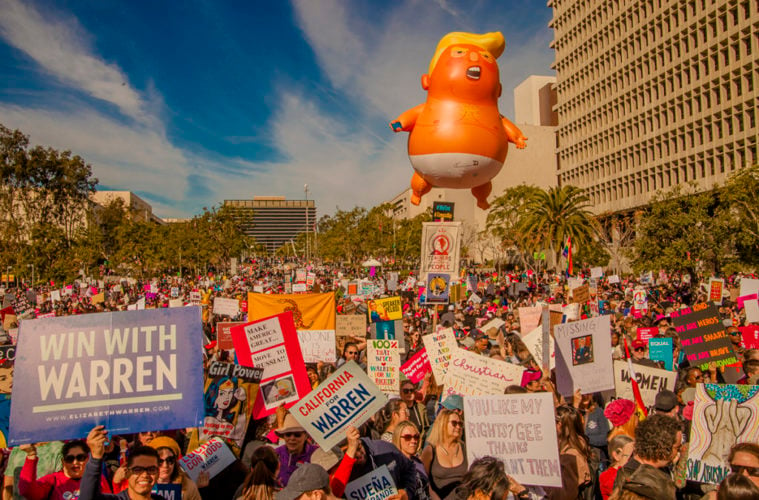This past Saturday, under sunshine and blue skies, more than 350,000 people peacefully gathered in downtown Los Angeles for the fourth annual Women’s March L.A. Though the crowd didn’t come close to the 750,000 people who made it the largest women’s march in the country in 2017, the spirit of protest was palpable, with everything we’ve come to expect from the gathering — the clever homemade signs, the pussy hats, the popular Baby Trump mega-balloon and an array of powerful speakers. With the theme of #WomenRising, the goal of the Women’s March L.A. this year was “to demand that the next president of the United States have a clear agenda to advance women’s rights,” according to Emiliana Guereca, president of the Women’s March Foundation.
The event began in Pershing Square with a pulsing rally led by Elder Gloria and the Tongva Nation, followed by speeches from leaders of the Global Circles of Women’s Intercultural Network, the Feminist Majority Foundation, Assembly members and others. After a “3-2-1” count, the diverse crowd of women, men and children bearing signs and chanting for a range of causes (including a woman’s right to choose, LGBTQ rights, immigration, voter reform and, of course, simply “dumping Trump”) progressed to City Hall to hear from celebrity activists, politicians and performers including Marlee Matlin, California Democratic Representative Maxine Waters, Mayor Eric Garcetti, Caitlyn Jenner, Seal, Jordin Sparks and more.
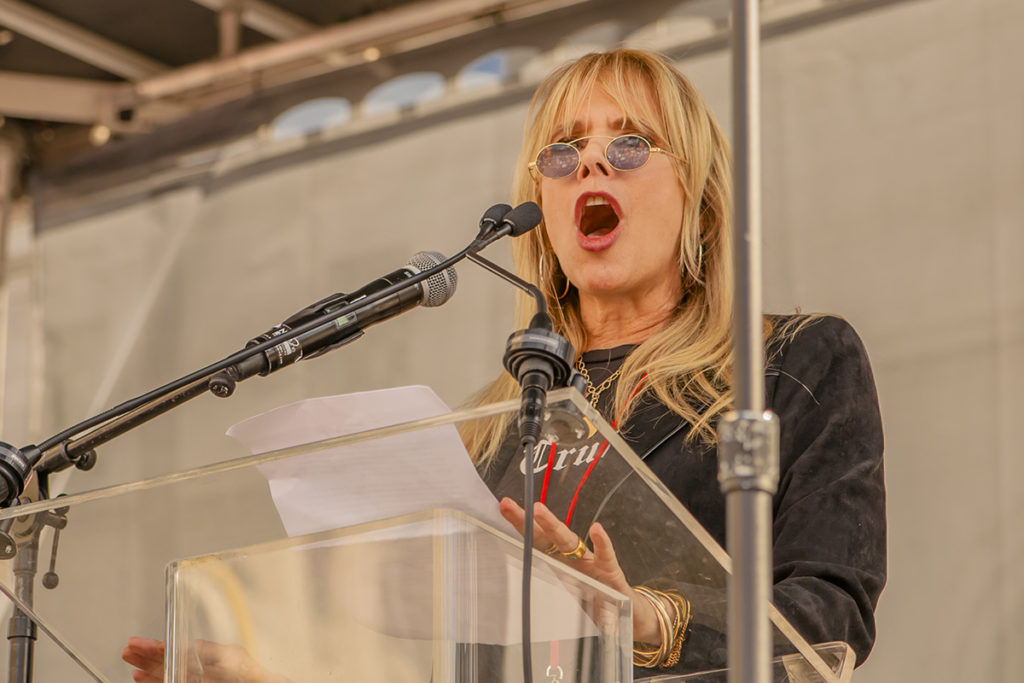
Rosanna Arquette speaking at the 2020 Los Angeles Women’s March. (Star Foreman)
Actor and activist Rosanna Arquette gave a passionate opening speech in light of the ongoing Harvey Weinstein trial and the rise of the #MeToo and #TimesUp movements. “To those of you who have been abused, I’m so, so sorry. But we must say, ‘No more.’ We will not stand by while predatory men attempt to destroy our careers and reputations,” she said to loud cheers. “I see the faces of so many good men here today. Thank you. This gives us hope.”
Some marchers wore early 20th-century–esque garb to honor the 100th anniversary of the ratification of the 19th Amendment, granting women voting rights. Filmmaker Jennifer Siebel Newsom, wife of California Gov. Gavin Newsom, gave the keynote speech celebrating the suffrage movement as a precursor to the day’s activism, while also acknowledging its historic shortcomings for women of color: “In 2020, I have no doubt that it will be women who will lead again, rise up and move this country forward on a path toward justice.”
For more images from this year’s Women’s March, check our print edition and the full slideshow: Women Rising: Scenes From the 2020 Women’s March L.A.
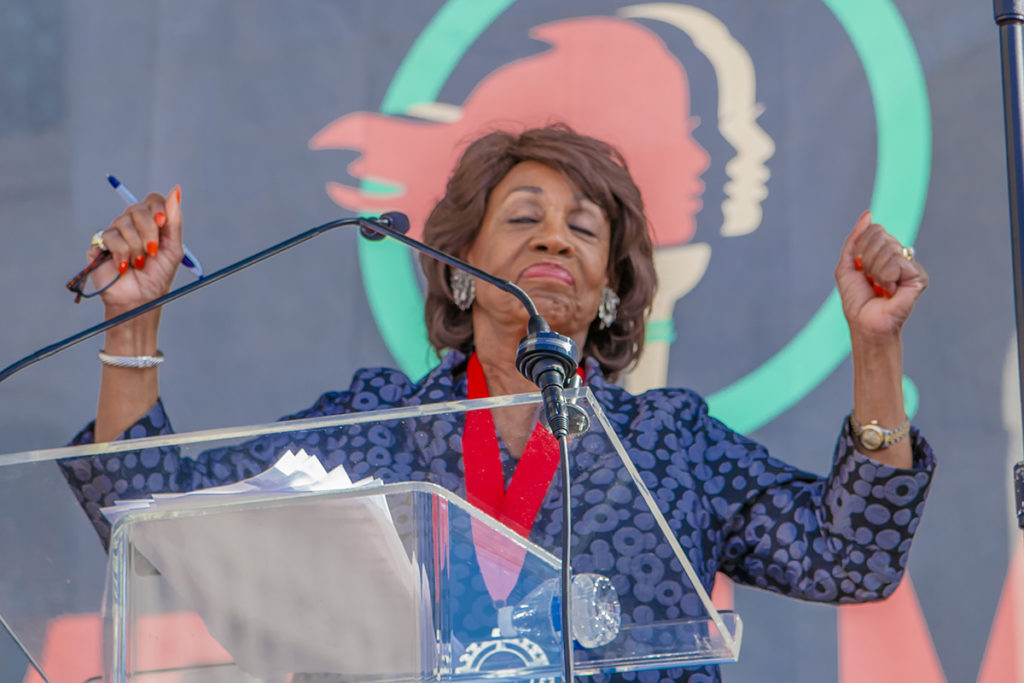
Rep Maxine Waters at the 2020 Los Angeles Women’s March. (Star Foreman)
Rep. Waters, known for her powerful catchphrase “reclaiming my time,” got the biggest welcome and response. “Women are leaders,” she proclaimed. “This is our time. It is a new day. And a new way!”
As with past marches, activist organizations’ booths, food trucks and independent T-shirt sellers abounded. And while there were a number of notable African-American speakers and performers on the stage, including Adrienne Bailon, Jenifer Lewis and Raven-Symoné, there was anger among some protesters due to exclusion of leaders from the Black Lives Matter movement. For the first time since its inception, BLM reps were not invited to speak at the L.A. march, which led to a boycott and outrage on social media by the group and its followers. BLM organizer Melina Abdullah said the exclusion was a miscalculation on the part of WMLA. “The backlash speaks volumes to the power of Black Lives Matter,” she told L.A. Weekly. “People understand that we’re doing important on-the-ground work every day of the year.”
Some marchers carried “Black Lives Matter” signs in active protest. Student Jasmine Gill, who is of Mexican and Indian descent, proudly carried her sign that read: “Here to Remind WMLA: Black Lives Matter. It’s Not Feminism If It’s Not Intersectional.” Cal State Long Beach English literature graduate student Danielle Broadway echoed the sentiment with her sign: “Black Womxn Matter.”
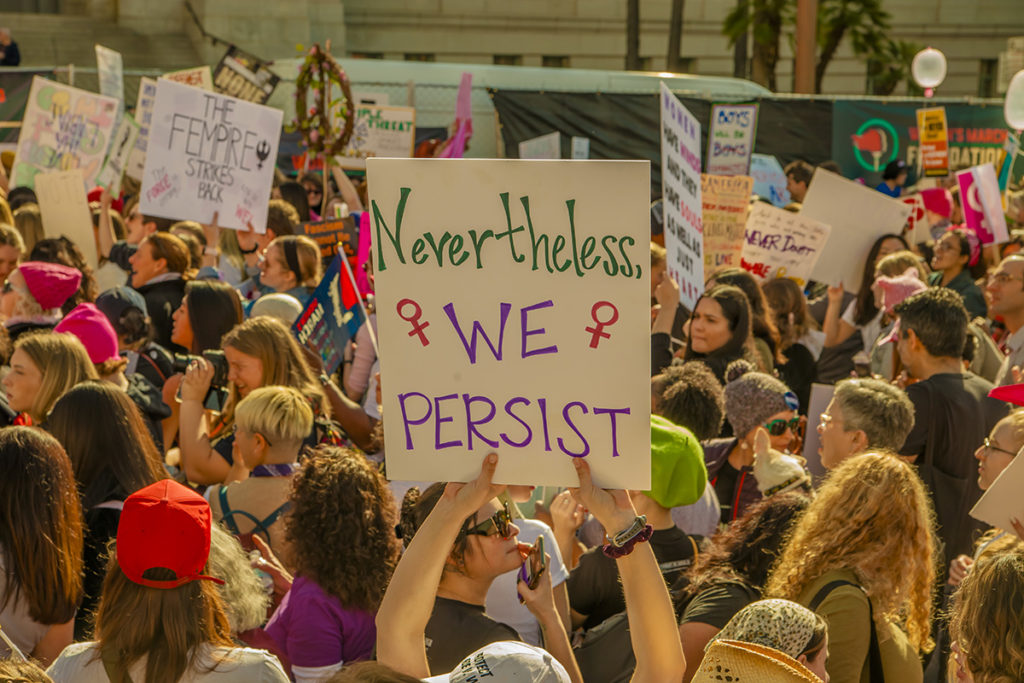
The 2020 Los Angeles Women’s March. (Star Foreman)
It’s not the first time controversy has surrounded the march. Last year, ahead of the 2019 event, one of march’s founders accused some of the national group’s leaders of anti-Semitism due to criticism of Israeli policy and another’s association with Louis Farrakhan. (Both stepped down from the board soon after.) Contentiousness within the organization did see the march’s numbers decrease somewhat, but the emphasis on creating change at the polls the past couple years obviously still resonated. The 2018 midterm elections saw a record-breaking 103 women elected to Congress, and the Women’s March arguably played a role in helping to raise awareness about voting and empowering women to run for office.
The need for unity among women, people of color, the LGBTQ community and liberals in general was reiterated throughout the day, and overall, the mood at the march was upbeat and hopeful. The first march took place the day after Donald Trump’s inauguration, and three years later, the desire to prevent history from repeating itself gave the gathering a sense of urgency and significance. “I’m just excited to see that there’s still passion. Given the literally thousands and thousands [pieces] of misinformation coming at all of us every day from our president alone, you can get fatigue,” said Andrea Lipton, chairperson of the leadership development committee for the Stonewall Democratic Club, wearing a Notorious RBG tee. “I’m encouraged to see that people are still turning out and participating in the process.”
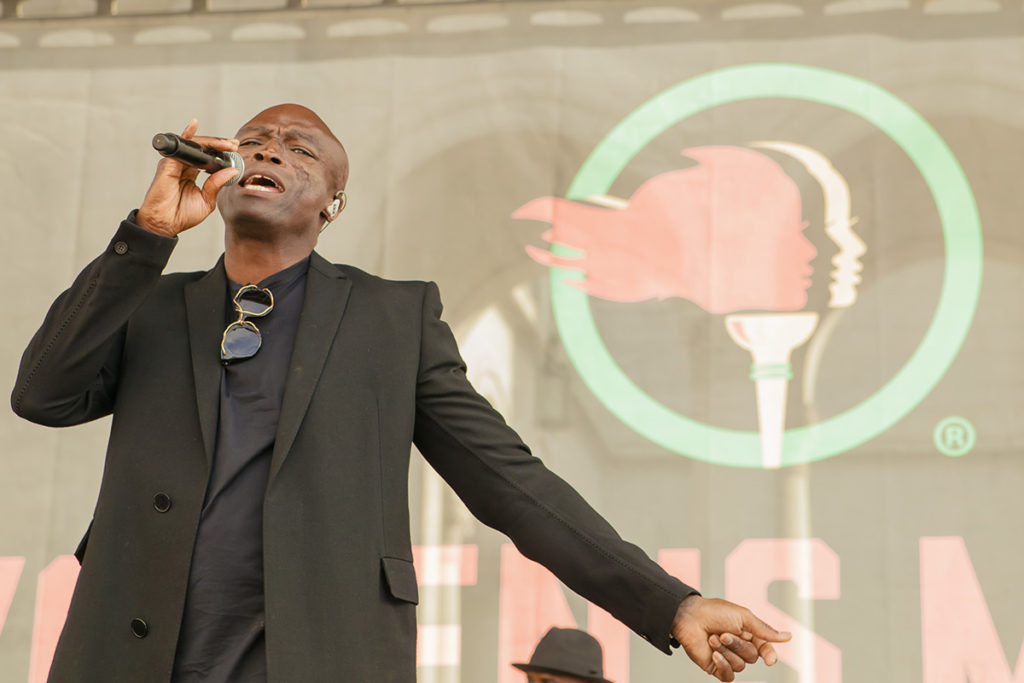
Seal performing at The 2020 Los Angeles Women’s March. (Star Foreman)
Seal’s moving rendition of soul legend and civil rights activist Sam Cooke’s famous “A Change Is Gonna Come” at City Hall said it all. Resonating throughout the streets of Los Angeles, the crowd swayed, clapped and joined in singing, “It’s been a long time, a long time coming. But I know a change gonna come, oh yes it will.”
Updated February 25, 2020.
Advertising disclosure: We may receive compensation for some of the links in our stories. Thank you for supporting LA Weekly and our advertisers.

